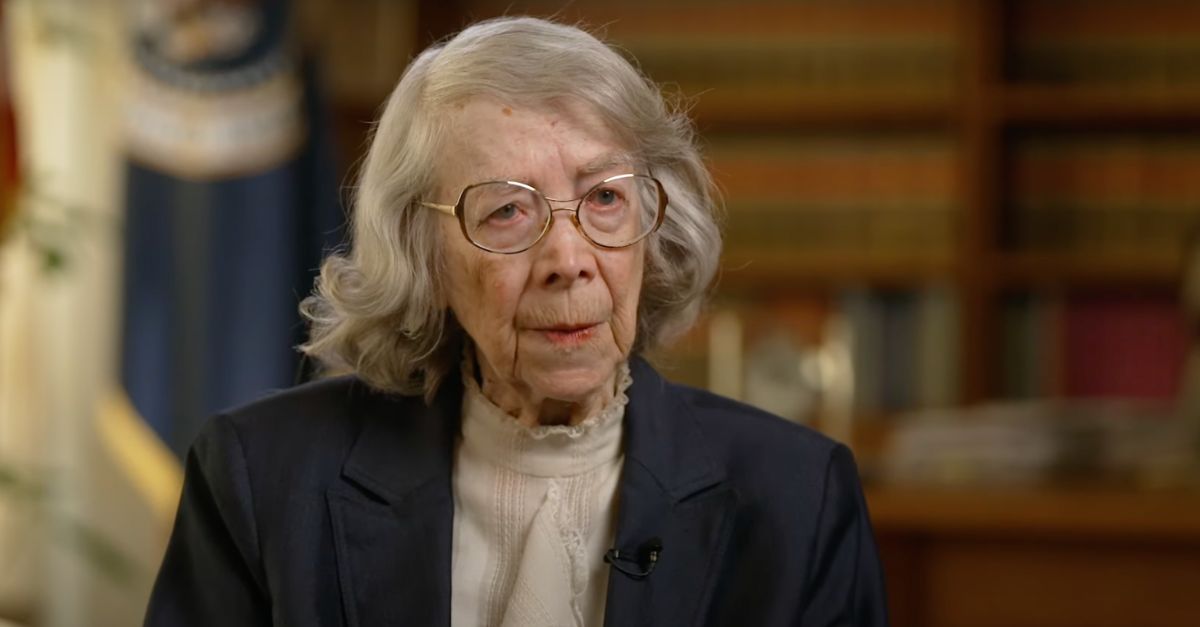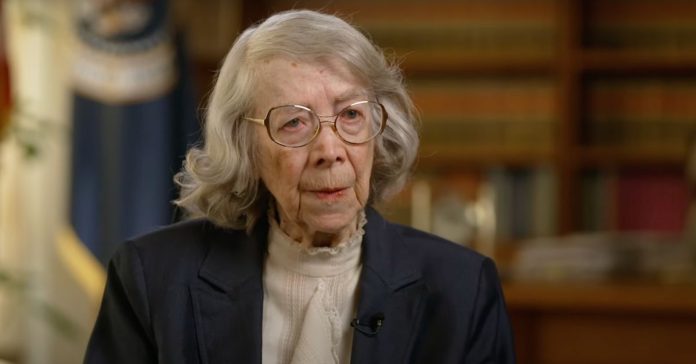
U.S. Circuit Judge Pauline Newman, 96, was suspended from hearing cases after the Judicial Council of the Federal Circuit unanimously found that the judge’s refusal to submit to a mental examination was improper. Newman, a Ronald Reagan appointee, was, until the council’s order, the oldest federal judge still on the bench. (Screengrab via YouTube).
A 96-year-old federal appellate court judge whose co-workers say has been habitually confused and belligerent scored a partial win in court Monday against the panel of fellow judges she sued after being suspended. That suspension was upheld last Wednesday, and the judge is still not permitted to retake the bench.
Ronald Reagan appointee U.S. Circuit Judge Pauline Newman is the oldest judge on the federal judiciary. Newman served for nearly four decades on the U.S. Court of Appeals for the Federal Circuit until she was suspended in September by the Committee on Judicial Conduct and Disability for refusing to cooperate with an investigation into her mental capacity.
Newman’s mental health and fitness to serve was called into question after colleagues complained that her docket dragged woefully behind an appropriate timeline, and raised concerns about the judge’s inappropriate behavior. Ultimately, an investigation was conducted at the behest of the committee and investigators found “overwhelming evidence” of Newman’s memory loss, lack of comprehension, and confusion, and said the judge was often “frustrated, agitated, belligerent, and hostile towards court staff.” They provided numerous examples of Newman’s problematic behavior, ranging from threatening to have her own staff arrested to incoherent and paranoid rambling.
Last September, the committee issued a lengthy written decision in which is said that although Newman “served with distinction” and was “the most beloved colleague on our court,” that it had “increasing doubts” as to whether the nonagenarian could properly fulfill her duties on the bench.
The committee directed Newman to undergo a 30-45-minute interview with a neurologist and a full neuropsychological examination with hours of cognitive testing, but the judge refused. Newman also refused to provide the committee with medical records from the prior two years dealing with cognitive deficiencies and fatigue. Instead, Newman offered her own medical experts, who she said would examine her for a much shorter period of time. The committee responded with a suspension.
After Newman was informed that she would no longer be assigned new cases over which to preside, lawyers filed a federal lawsuit on her behalf in which Newman sued Chief Circuit Judge Kimberly A. Moore and all the other Federal Circuit judges on the committee over their handling of the complaints about Newman’s mental capacity. In the lawsuit, Newman challenged not only the actions taken against her, but also the legal provisions that allowed the judicial committee to issue the suspension order.
Newman was represented in the lawsuit by New Civil Liberties Alliance (NCLA), a public-interest law firm that focuses on the “administrative state.” The same firm also represented Newman in a direct challenge of the committee’s ruling on her suspension, which is proceeding separately.
U.S. District Judge Christopher R. Cooper, a Barack Obama appointee, denied Newman’s request for a preliminary injunction against Moore and the others Monday, but allowed portions of the judge’s lawsuit to move forward against her colleagues. Newman’s win, however, is likely to be short-lived as Cooper found that her claims were not likely to succeed on the merits once litigation concludes.
Cooper ruled that some of Newman’s claims were moot, because they challenged a preliminary suspension that was later lifted. Cooper left in place some of Newman’s challenges to the judicial discipline regulations, but warned that it would be a “demanding standard” to score an ultimate win. The judge also allowed Newman’s claim for failure to provide notice for what constitutes a mental disability to proceed.
Cooper rejected Newman’s argument that the Judicial Council lacked authority to suspend a judge for disability as well as a claim that the investigating body had no authority to conduct its look into Newman’s health.
In an email to Law&Crime, Newman’s lawyer, Greg Dolin said, “We are certainly gratified that Judge Cooper did not dismiss the entirety of the action and we will proceed on the claims that remain live.”
Dolin said Newman’s legal team is still evaluating its options for appeal of the dismissed claims.
Newman suffered a total loss at the hands of the judicial committee Wednesday when a new panel of judges found that Newman’s suspension should be upheld.
In her challenge, Newman argued that the members of the judicial committee who knew her personally should have recused themselves from considering her case. She said that because all the members of the committee had “personal knowledge” about the facts or were simply “biased,” they should have transferred the case to another circuit council. Both arguments fell flat with the council that reconsidered the ruling, which dismissed the argument as “unavailing.”
The panel of judges who heard Newman’s challenge to her suspension consisted of primarily Bill Clinton appointees from other circuits: U.S. Circuit Judge for the Fourth Circuit William Byrd Traxler Jr., Senior U.S. District Judge for the Northern District of Ohio Patricia A. Gaughan, Senior U.S. District Judge for the Northern District of California Phyllis J. Hamilton, Senior U.S. Circuit Judge for the Ninth Circuit M. Margaret McKeown, Chief U.S. Circuit Judge for the Fifth Circuit Carl E. Stewart, and Senior U.S. District Judge for the Eastern District of Louisiana Sarah S. Vance. The panel included one George W. Bush appointee, Senior U.S. Circuit Judge for the Third Circuit David Brookman Smith.
The committee also found that Newman had not been denied any due process in the proceedings against her. The judges noted that even though Newman was not legally entitled to see witness statements, the judge was actually given “more process than she was due under the Rules,” because she was shown all the evidence against her.
Likewise, the committee rejected Newman’s argument that there was no good cause to ask her to submit to a medical examination.
“Newman may suffer from a disability that prevents her from discharging the duties of office, including affidavits and her own emails illustrating interactions that suggest memory loss, confusion, lack of comprehension, paranoia, anger, hostility, severe agitation, and an inability to perform tasks that Judge Newman previously could perform with ease,” the committee said in its 29-page ruling.
In a statement Wednesday, Newman’s legal team slammed the judge’s “indefinite suspension” as “unprecedented in American judicial history,” and accused the council of “chang[ing] the rationale for its actions and even alter[ing] its allegations, all to accomplish an apparently predetermined outcome.”
The group said the allegations against Newman are “factually baseless” and demanded that Newman be restored to her full judicial duties.
In the same statement, Newman said:
Nothing has changed since last February — I continue to be fully able to perform the duties of the office which was entrusted to me. This has been confirmed by two physicians and numerous individuals who have interacted with me over the last twelve months. This battle is not just for me, but for the very concept of judicial independence and protection of our constitutional structure. I will continue to fight it.
Dolin said he was “disappointed” with the decision but noted that “the Judicial Council was acting in an administrative rather than judicial capacity.”
“This fact indicates its actions are subject to the same review as actions of any other agency,” Dolin said, and promised that “Judge Newman intends to fully press for such review in properly constituted Article III courts.”
Mark Chenoweth, President and Chief Legal Officer, of NCLA called the ruling “a dark day for the federal judiciary.”
“The Committee on Judicial Conduct & Disability fell victim to a false narrative about the events that have transpired over the past year,” Chenowith continued. “Numerous federal judges have privately encouraged NCLA’s defense of Judge Newman.”
Chenowith commented about those who have encouraged Newman to keep fighting: “Like me, they fear for a nation in which judicial independence is lost by the judiciary’s own misguided hand.”

